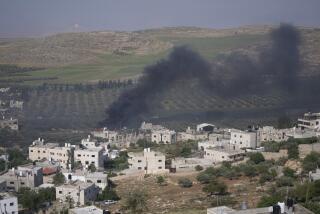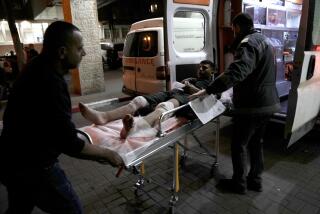Settlement outposts at root of Jewish violence in West Bank
For months many Israelis shrugged off the mosque burnings, the uprooted Palestinian olive trees and even the death threats against Jewish leftists. But when young settlers this month vandalized army bases and stoned Israeli soldiers, the question of Jewish terrorism turned into a national emergency.
The recent flare-up in settler violence has puzzled many because it comes when there are no peace talks that might lead to land concessions, Palestinian attacks in the West Bank have dropped to new lows, and Israel is led by a conservative government that is expanding settlement construction.
The explanation can be traced to this illegal settlement outpost near the Palestinian city of Ramallah and others like it. After years of legal wrangling, Givat Assaf, a collection of trailers and sheds that house 25 Jewish families, was slated for demolition this month. At the last minute, Givat Assaf and several similar outposts won a temporary reprieve, giving settlers a few more months before government bulldozers are supposed to arrive.
With their legal challenges exhausted, settlers are increasingly worried that Israeli Prime Minister Benjamin Netanyahu’s right-wing coalition is preparing to enforce court orders to dismantle outposts.
So a fringe group of young extremists, fueled by the ideological belief that the entire Holy Land belongs to the Jewish people, have embarked on a campaign of incitement, destruction and intimidation in a last-ditch effort to save their communities.
“This is our home and we will not give in easily,” said Revital Sorek, 32, a mother of eight who lives in Givat Assaf. “Evacuation and relocation are out of the question. You don’t move a Jewish community in the Land of Israel. In the event that things reach an evacuation, then yes, there will be use of force. We will not go like lambs to the slaughter.”
The recent militant attacks appear aimed at making the prospect of dismantling even one outpost so unappealing and politically costly that the Netanyahu government will search for a way to back off.
“The strategic goal is to try to frighten Israeli society to such a degree that it will withdraw from any possibility of a major removal of settlements in the future,” said Yehuda Ben-Meir, a security analyst at Tel Aviv’s Institute for National Security Studies. “They’re saying, ‘For every two bricks the government tries to remove somewhere, we’ll go wild.’”
The militants think “the only way to prevent it from becoming a slippery slope toward wholesale evacuation is to put up a fight for every house or even a chicken coop,” Ben-Meir said. “Their tactic is to react to even the smallest of such moves with such violence so that eventually the army tells the government they can’t do it.”
The so-called price-tag campaign began last year with loose-knit gangs of disgruntled youths. Security officials began warning recently that the groups were becoming more organized and sophisticated, using databases to track potential targets, carrying out surveillance and communicating through social networks.
Some Israeli pundits now say the gangs, also known as hilltop youths after the sites commonly chosen for outposts, are a bigger security threat in the West Bank than Palestinian militants.
In what appeared to be coordinated attacks, youths struck in three locations on Dec. 12, throwing stones at high-ranking officers, breaking into a closed military zone near the Jordan River and vandalizing an army facility.
Israeli Defense Minister Ehud Barak said the government should consider designating the settler gangs, which are also implicated in a string of attacks against Palestinians, as terrorist organizations.
Netanyahu, who is reluctant to alienate his right-wing supporters, rejected the label but vowed that the government would crack down on anyone who attacks the Israel Defense Forces.
“We must join forces against this extremist phenomenon and erase this stain,” Netanyahu said Dec. 20 during a visit to the attacked army base.
Security officers have arrested those they called the ringleaders of the gangs. But vandalism of mosques and olive trees has continued, including one attack in which “Muhammad is a pig” was spray-painted on a wall.
Critics say the government waited too long to respond to the attacks because they initially targeted only Palestinians. No indictments were handed down and only a few arrests were made in those incidents. Usually suspects were released.
Now, analysts say, the real target is Israel’s government.
“The recent acts are clearly addressed to Netanyahu and Barak,” said Shlomo Aronson, a Hebrew University of Jerusalem political science professor. “These groups are not immediately concerned with the peace process or the Palestinians, but rather with the Supreme Court decision to remove outposts.”
It’s not the first time Israel has battled extremist violence. Assassins targeted Palestinians in the 1980s and ‘90s until Israeli security forces cracked down. And it was a right-wing Israeli who assassinated Prime Minister Yitzhak Rabin in 1995 in the face of peace efforts with the Palestinians.
But the recent flare-up has thrust outposts to the forefront of the Mideast conflict.
To most of the international community, all of Israel’s housing settlements on land seized during the 1967 Middle East War are illegal. But Israelis have long distinguished between settlements that have been authorized by the government and the outposts that were built by settlers without permission. Many are on private Palestinian land, Israeli courts have ruled.
Currently there are about 95 outposts, with more than 4,000 residents, mostly religious and ideological families living in temporary shelters, trailers and prefabricated housing. They are a fraction of the nearly 300,000 Israelis living in the West Bank.
Though a succession of Israeli governments have promised to dismantle the outposts, demolitions are rare and the current government gives most of them implicit support by providing electricity, water, roads and security.
Court challenges by Israeli groups and Palestinian landowners have succeeded in winning demolition orders for several outposts, including Givat Assaf, Migron and Amona. But some lawmakers are now searching for ways to retroactively legalize the outposts.
“They’re trying to pressure the government and it’s working,” said Hagit Ofran, a spokeswoman for Peace Now, an Israeli group that opposes settlements. “The government is afraid.”
Ofran, herself a target of death threats and vandalism attacks, said the government’s conservative agenda has only emboldened the settler gangs.
“The fact that we have a right-wing government,” she said, “only makes them feel they have the opportunity to behave even more extremely.”
News assistant Batsheva Sobelman in The Times’ Jerusalem bureau contributed to this report.
More to Read
Start your day right
Sign up for Essential California for news, features and recommendations from the L.A. Times and beyond in your inbox six days a week.
You may occasionally receive promotional content from the Los Angeles Times.






